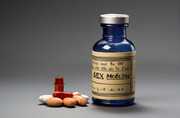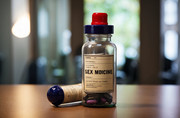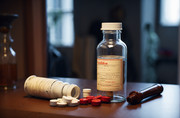By 2024, it should be increasingly common to take the anti-STI tablet after high-risk intercourse.
However, not everyone has much cause for celebration.
We are getting there this time around: a universally accessible antibiotic to combat STIs should be on the market shortly. We call it doxyPEP. It functions similarly to the morning-after pill and should be taken as soon as possible after unprotected intercourse, ideally within 72 hours. However, its main concern is syphilis and chlamydia, not pregnancy.
Vox notes that we first learned about it in 2015. The medication was then tested on around thirty human guinea pigs, but the very encouraging outcomes on such a tiny sample were sufficient to create a stir. Some patients started getting doxyPEP without even waiting for more testing to be completed, and without a practitioner's clearance or supervision. Word of mouth also seems to have been effective.
Get free daily email access to Slate.fr to ensure you never miss an item!
Now subscribe
However, a drug's positive reputation is insufficient to get it on the market. However, it's typically a positive indicator if health agencies are beginning to suggest it. This was the case with the one in San Francisco, which suggested that he assist transgender and cisgender men and women in the battle against syphilis as early as October 2022.
A universal cure-all?The US Centers for Disease Control and Prevention (CDC) released a paper on October 2, 2023, outlining the circumstances under which to give doxyPEP. Since then, the antibiotic has progressively gained popularity. It remains unclear, and experts may make recommendations for modifications by November 16.
At that point, the official DoxyPEP administration guide will become accessible. Therefore, 2024 ought to be the year when the anti-IST "pill of the next day" becomes widely prescribed, at least for trans women and gay men who have engaged in homosexual activity.
The issue is that resistance may ultimately develop to any antibiotics, particularly when used often. The bacterium that causes illness have the ability to change and ultimately become more harmful when exposed to certain chemicals. The scientific community is unsure about which side to dance on, therefore wouldn't it be preferable to severely restrict access to doxyPEP?
This medication's lack of equal effectiveness for all demographic groups is another issue. The two large investigations, one from April 2023 in San Francisco and one from France released in 2017, exclusively evaluated guys who had intercourse with other men or trans women. Vox claims that these groups were chosen according to the greatest likelihood of infection.
Nevertheless, to understand the effects of doxyPEP on cisgender women, you must examine the findings of a Kenyan research, which indicates that the medication is not nearly as successful for them as it is for the previously mentioned groups. However, experts contend that treating the most vulnerable groups properly already stops the spread of STIs, safeguarding some women of opposite sexes inadvertently. It is our right to locate this light.


